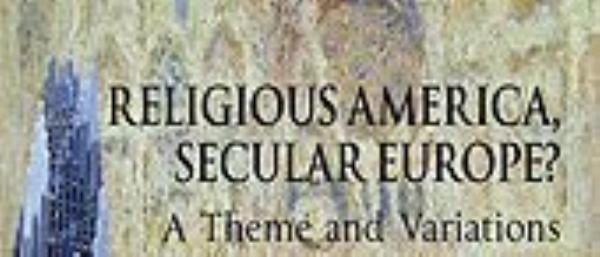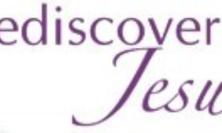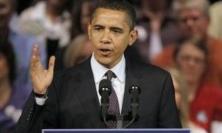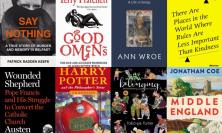Can we describe America as ‘religious’ and Europe as ‘secular’? This is the basic question analysed in this book by Peter Berger, the eminent Professor of Sociology at Boston, Grace Davie of the University of Exeter and Dr Effie Fokas at the LSE. They take as their theme the idea of ‘eurosecularity’, and compare it with the ‘religious’ United States by looking at four dimensions or ‘variations’ of the differences between the two. The project originated from a workshop held in the Berlin Protestant Academy from 2001-3, which aimed to gain a better understanding of the ‘exceptional nature of Europe’s religious life compared with the more positive pro-religious trends elsewhere in the world.’ Why, for example, was it so contentious to suggest mentioning the Christian God in the preamble to the proposed European Constitution? Why do some Eurosceptics think that there is ‘altogether too much religion in the United States which has a dangerous effect on policy’, and why are Americans in turn ‘taken aback by Europe’s secularity?’ In Europe religion is regarded as part of the problem; in the United States it is part of the solution.
Berger, Davie and Fokas explore seven specific differences between Europe and the United States: differences in Church-State relationships; questions of pluralism; different understandings of the Enlightenment; different types of intellectuals; varieties in culture and how these are understood; institutional contrasts (how, in concrete terms, the Enlightenment and associated cultures are sustained); and the contrasting ways that religious organisations relate to indices of social difference (notably class and ethnicity). In short, how did the French idea of ‘freedom from belief’ mutate as it crossed the Atlantic into a ‘freedom to believe’?
This work attempts to explain ‘European secularity’ in a European context in which ‘both Catholic and Protestant Churches are in deep trouble’ (p.11). The existence in European nations of ‘a state Church or its successor’ is contrasted with a ‘seemingly limitless number of denominations’ in the United States. (Differences within Europe, for example between French and British approaches to the Enlightenment and Church-State relations, are also explored.) Notably – and at least until now – Europe has not been influenced by ‘the massive presence of Evangelical Protestantism which is a crucial part of the American scene.’ Along with resurgent Islam, ‘the most dynamic religious movement in the world today is Pentecostalism’ (not least in the global South where there are an estimated 250 million Pentecostals). In order to analyse this and other differences, Religious America, Secular Europe? traces the different histories of religion in Europe and the United States, ‘paying particular attention to the relationship between context and theory’. To put it in economic terms, religion in Europe is characterised by a declining monopoly (of ‘state subsidised Churches’), and in America by ‘a flourishing market’ (p.35). Europeans regard their Churches as ‘public utilities’ rather than ‘competing firms’; they are useful social institutions regarded with benign benevolence which the majority of the population are likely to need at one time or another in their lives.
Paradoxically, in America the First Amendment served to reinforce a strong link between religion and the nation. As Dwight D. Eisenhower said: ‘Our Government makes no sense unless it is founded on a deeply held religious belief – and I don’t care what it is!’ Immigrant communities ground their identities in American society by gathering into separate immigrant congregations. But it is the unresolved contradictions apparent in the American constitution itself and reiterated in the juridical system (mainly the Supreme Court) that characterise pragmatic American attitudes to religion. For instance, public prayer is not allowed in public schools yet the United States Congress employs chaplains to lead its own daily prayers. In French laïcité, where the separation between Church and State is pronounced, the freedom of conscience claimed by religious believers and the freedom of thought claimed by the teaching establishment become incompatible. Inevitably the question is: ‘How can strict separation be maintained alongside the evidence of the presence of religion at every level of American society, formal as well as informal?’ (p.79)
The book also examines the place and practice of religious education in America and Europe and their contrasting attitudes to welfare provision. However, its main focus is to challenge the theory that secularisation is the inevitable result of modernisation, and it concludes that secularisation is a particularly European experience. It suggests that, despite differences between religious America and secular Europe, in the global future ‘it will be entirely “normal” to be more fully modern and fully religious’. For politics and theology, the real questions, as President Obama recently stressed in his address at Cairo University, will focus on relations with the religious worlds of the Evangelicals and Islam. There are implications for foreign policies and western attitudes towards Islamic countries; in Europe these come together in the question of Turkey. But at the heart of these political issues lies what the sociologist Jose Casanova identifies as the secular paradox: ‘In the name of freedom, individual autonomy, tolerance and cultural pluralism, religious people (Christian, Jewish and Muslim) are being asked to keep their religious beliefs, identities and norms “private” so that they do not disturb the project of a modern, secular, enlightened Europe.’ The future reality is that religious people cannot and will not do this as we learn to live in a post-secular society.
The reviewer, John Battle, is Member of Parliament for Leeds West.






